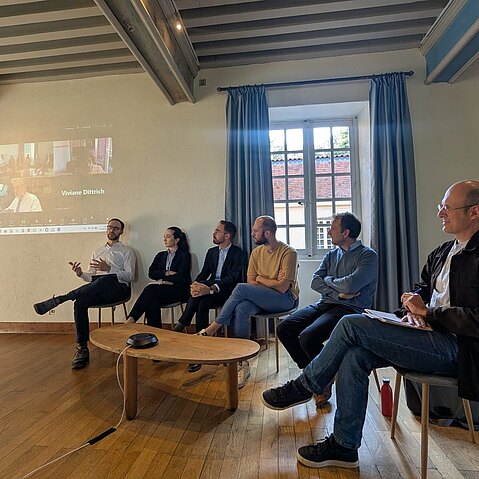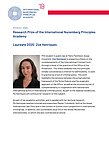We are pleased to announce that the 2025 Research Prize in international criminal law presented by the International Nuremberg Principles Academy has been awarded to Zoé Henriques, a doctoral researcher in international criminal law at Université Paris-Panthéon-Assas.
Ms Henriques is conducting doctoral research on the complementarity of the Prosecutor of the International Criminal Court (ICC), with a particular focus on the practices of the Office of the Prosecutor. Her work goes beyond a purely legal analysis, exploring how the Office interprets its mandate, defines its priorities and adapts its interventions to often complex political contexts.
The prize supports the laureate’s participation in the Adamas Residencies – European Residency Programme for Legal Researchers, which took place from 5 to 14 September 2025 at the Château de Goutelas in Marcoux, France, a unique site of cultural and historical heritage.
During the residency, Ms Henriques, along with five other legal researchers selected by project partners, presented and advanced her research and engaged in intensive exchanges with fellow participants and artists. The programme concluded with a closing session on 11 September bringing together all partner institutions for a collective reflection on the residency's outcomes. The Academy was represented by Deputy Director Dr Viviane Dittrich who participated remotely.
Each year, the Nuremberg Academy grants the Research Prize in international criminal law, which provides funding for a doctoral candidate or recent PhD graduate specialising in this field to participate in the Adamas Residencies. The programme is an initiative of the Château de Goutelas and is organised annually in cooperation with the Nuremberg Academy, the French Constitutional Council, the A.I.D.E. - Association Internationale de Droit Économique and the Institut Robert Badinter.
Inspired by artists' residencies, the Résidences Adamas offers a unique opportunity to:
- Provide an exceptional working environment that fosters connections between young lawyers, creators and researchers.
- Facilitate collaboration and dialogue between academic researchers and practitioners across different legal fields.
- Promote reflection on the role of legal humanism, particularly in constitutional, international, criminal and economic law.
- Explore the intersection of legal humanism with pressing contemporary social issues (new technologies, environment, migration, health, etc.).
- Further develop the Bibliothèque des Humanismes, a project initiated at the Château de Goutelas.
(pm/em)




